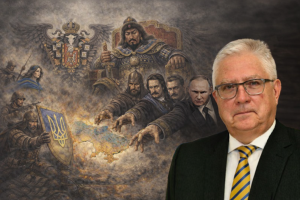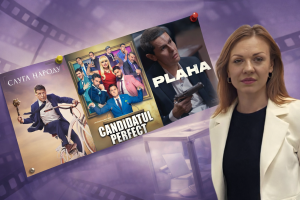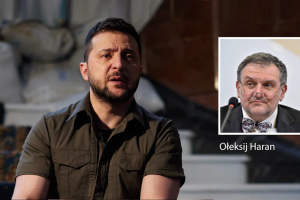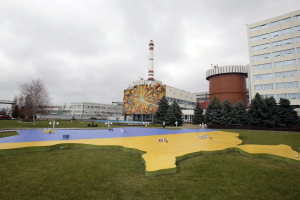The reaction of Ukrainian society to the full scale Russian invasion were not surprising for Ukrainians in general and for those experts who followed public opinion polls. We argue that the main trends in the public opinion of Ukrainians regarding Russian aggression were based on the Ukraine’s development during independence.
De-Sovietization
Since 1991, in the area of de-communization and de-Sovietization, the views of Russian and Ukrainian societies were diverging more and more. In 2021, 62% of Ukrainians (and the majority in all regions) have a negative view of Stalin's role in relation to Ukraine. Half of respondents supported the view that World War II arose as a result of a secret agreement between Hitler and Stalin on the division of Europe (29% disagree).[1] This is in sharp contrast to Russia, where this topic is banned for public discussion.
Russia’s full scale aggression only strengthened de-communization trend. In August 2022 poll, 59% of Ukrainians supported the decision to condemn the USSR as a communist totalitarian regime (only 13% against).
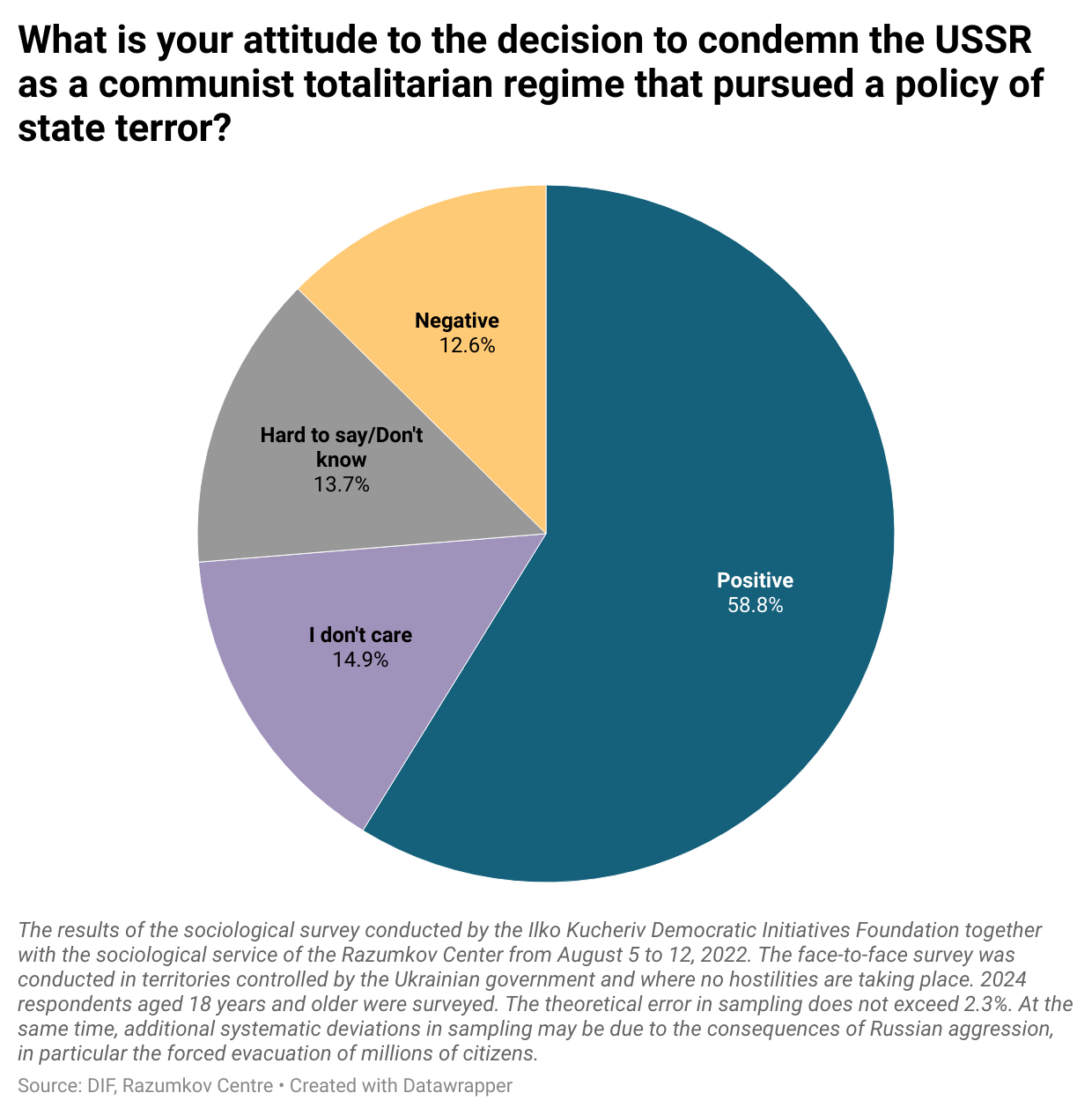
Compared to 2020, support for the decision to condemn the USSR as a totalitarian, repressive regime has increased by 25%. Moreover, over two years, the share of respondents who disapprove this decision of the central authorities has decreased by 19%.
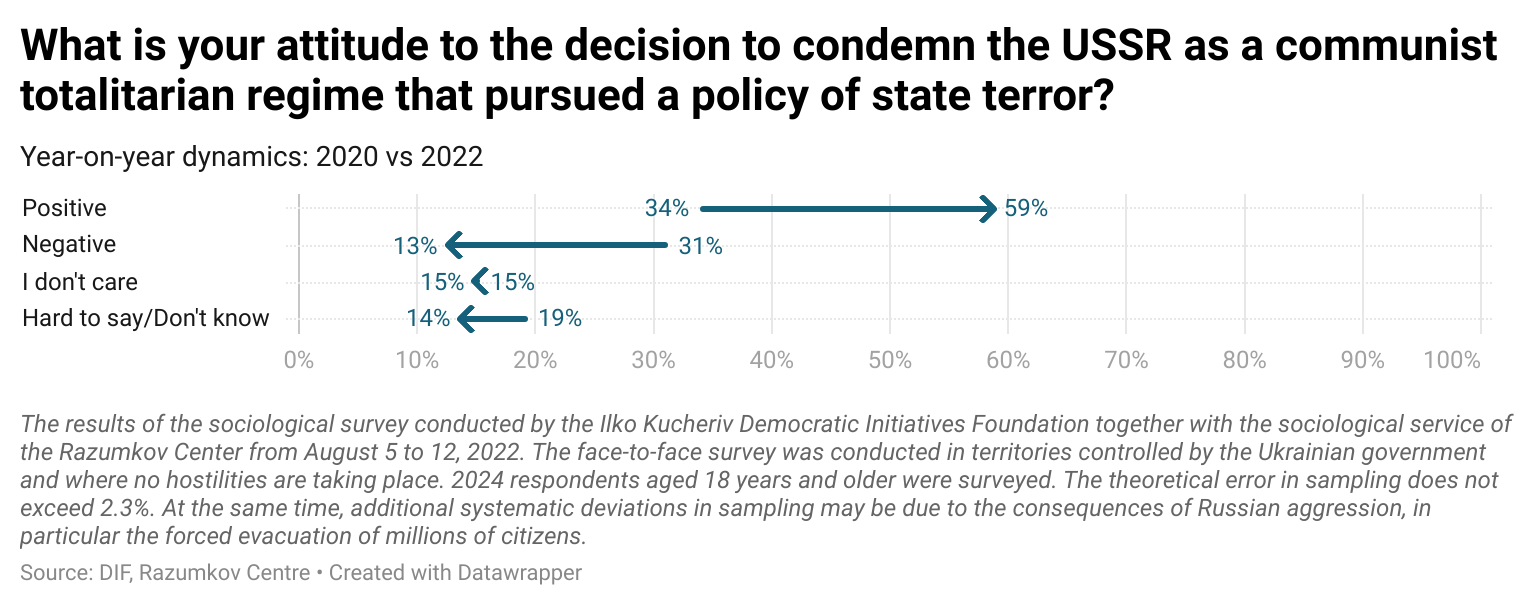
Among the citizens aged older than 60, the highest level of disagreement with the condemnation of the totalitarian regime of the Soviet Union remains (20%). Nevertheless, the vast majority (≥50%) in this age group, as well as in younger age groups, considers the decision to condemn the USSR justified. Also, respondents with higher income and higher education are more likely to condemn the USSR.
In Ukraine regional differences in attitudes to politics, history, geopolitics were always important. However, the basic trend, especially after February 24, 2022, is in diminishing these regional differences. But they did not disappear. The most controversial attitude to the condemnation of the USSR is observed in the South where the attitudes split in four almost equal parts (those who support it; oppose; do not care; could not answer the question). However, we predict that after Russian atrocities, including bombarding and terrorizing civilians in the South, the trend will move more and more to all-Ukrainian one. In all the regions of Ukraine, the attitude of Ukrainians toward the leader of Russia is clear and straightforward: 94% of respondents believe that Putin is a modern-day Hitler.

After the Orange Revolution, president Viktor Yushchenko tried to speed up the process of de-communization by removing monuments and renaming the streets. However, it was not very successful and was quite polarizing. You could move 20 km away from Kyiv and find Lenin streets and statues in small villages. During Euromaidan the “leninopad’ (removing of Lenin’s monuments) started from below. After February 24, this process included de-Russification which was quite natural. Until recently, we have had streets and monuments in every rayon to Pushkin (who praised Russian imperial victories in the Caucasus, Ukraine, and Poland). To keep the street named by Dostoyevsky (chauvinist, strongly anti-Western and Orthodox messianic) in Irpin destroyed by Russian bombardments or two streets in the very Kyiv does not look logical.
Almost 57% of respondents support the idea of renaming streets and squares associated with the Russian Federation, the Russian Empire and the Soviet Union. Thus, the majority of Ukrainians are favorable to the initiatives of local authorities to rename toponyms associated with Russia.
Negative attitude to renaming prevailed in August 2022 only in the Southern region of Ukraine: 42% opposed the renaming, 27% supported the renaming, 18% said they did not care and 13% could not answer the question.
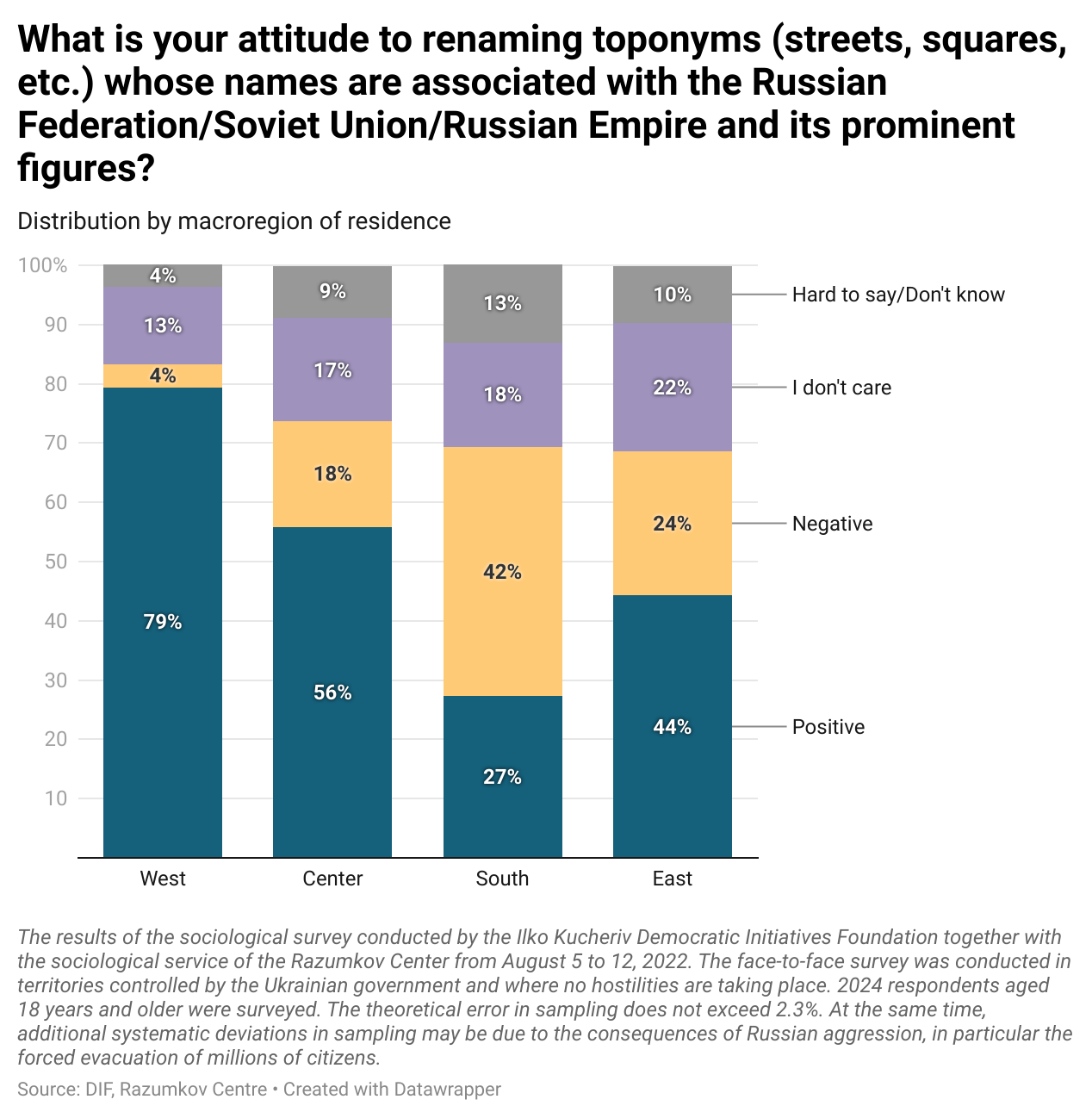
Among younger, formally more educated and wealthier citizens, renaming streets and squares finds more support than among older, formally less educated and poorer citizens. However, among all these categories of citizens, positive attitudes towards renaming absolutely prevail over negative ones.
Even among the respondents who identified Russian as their mother tongue a relative majority (39%) also support the de-communization and de-Russification of toponyms, while one-third of such respondents (33%) oppose it.
Responsibility of Russian people for the war
Some liberal Russians and Westerners believe that it is sole Putin’s responsibility for the war and removing Putin is the way to liberate Russia from dictatorship. Given the history of relations with imperial Russia and even with Russian democrats, Ukrainians are much more sceptic. There is a saying in Ukraine that “Russian liberal ends when it comes to Ukraine”.
Lots of Ukrainians, including thіs author, have relatives in Russia. But most of them are under influence of Kremlin’s propaganda and believe in necessity “to liberate us from Nazi”. The absence of desire to check the facts is striking. Russian society appears to be ill. Majority of Ukrainian respondents, regardless of region, language, age, education or financial status, believe that Russians are collectively responsible for this war. After the war, more than 75% of respondents would support the decision to completely severe all relations with Russia. More Russian atrocities, more radicalization of Ukrainians.
The following two questions are quite illustrating:

67% of respondents agree that “healthy nationalism” is needed. Over the years, the share of Ukrainians who see the importance of nationalism only increases with a parallel decrease in the share of people who do not support this opinion.
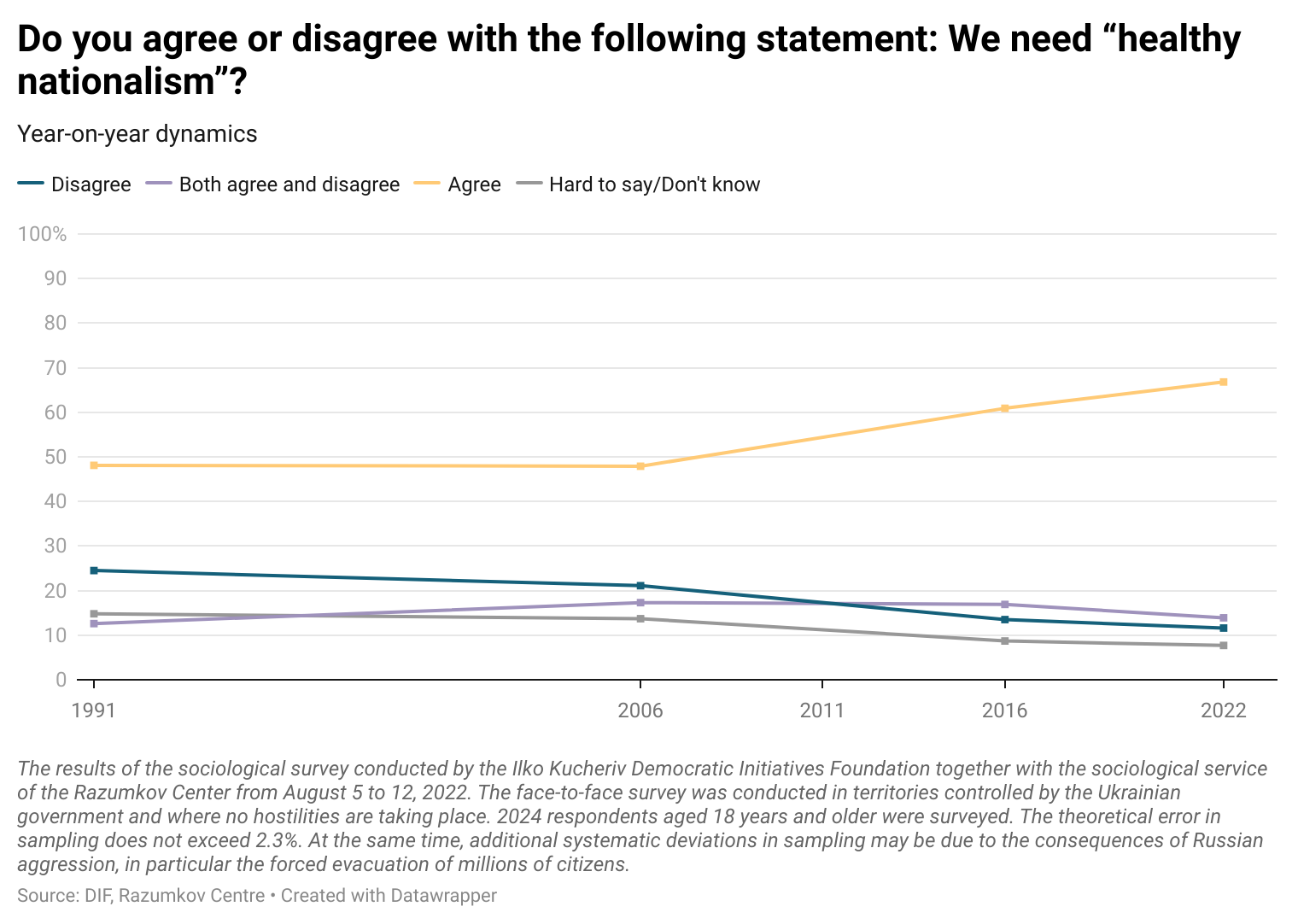
The vast majority of Ukrainians in all age groups, regardless of gender, level of education, financial situation or language of everyday communication, support the need for “healthy nationalism”. For instance, the thesis about the need for nationalism is supported by 51% of Russian-speaking respondents (21% of them disagree with this statement). Among the Ukrainian-speaking respondents, 74% agree with the need for nationalism, 7% disagree.
Among the residents of all macro-regions, only in the South the absolute support for the thesis that Ukraine needs “healthy nationalism” is not observed. In Mykolaiv and Odesa regions, 37% agreed and 34% disagreed with the statement about the need for nationalism.
The majority of Ukrainians (56%) believe that Russians are collectively responsible for Russia's military aggression against Ukraine. Only 18% agree that the war does not depend on the choice of ordinary Russians.
67% of Ukrainians in the Western regions, 59% in the Central regions, 43% in the Eastern regions, and 42% in the Southern regions agree with the responsibility of Russians for the consequences of the Russian war against Ukraine. 27% in the Southern regions and 23% in the Eastern regions disagree with the collective responsibility of ordinary Russians.
As with the statement about the necessity of nationalism, putting the responsibility for the Russian war against Ukraine on ordinary Russians is supported by the majority of respondents, regardless of gender, age, education or financial status.
It is illuminating that even among respondents who communicate in Russian in everyday life, a relative majority (47%) also believes that the war is the result of actions or lack of actions on the part of ordinary Russians. 22% of respondents disagree with this statement.
The changing attitude towards the role of the Ukrainian Orthodox Church (Moscow Patriarchate)
One of the major tools of promoting Kremlin’s aggressive narratives in Ukraine is Russian Orthodox Church (ROC). The branch of the ROC in Ukraine is officially titled Ukrainian Orthodox Church (UOC) without mentioning its subordination to Moscow. Not surprisingly, for older generation in Ukraine, especially in villages, it is a bit confusing to differentiate it from autocephalous Orthodox Church of Ukraine. Therefore, in Ukraine we usually add Moscow’s patriarchate in brackets to the UOC – UOC (MP). The posture of the ROC and Patriarch Kirill who blessed the war and the hesitant position of the leaders UOC (MP) to denounce Kirill, participation of some of its priests in direct support of the Russian Army led to serious domestic tension within UOC (MP) which tried to maneuver. But it was not very convincing even for the part of their own believers.
52% of respondents agree that the activities of the Ukrainian Orthodox Church (Moscow Patriarchate) rather encourage Russian aggression. There are only 11% of those who believe that the UOC (MP), on the contrary, contributes to the defense of Ukraine.
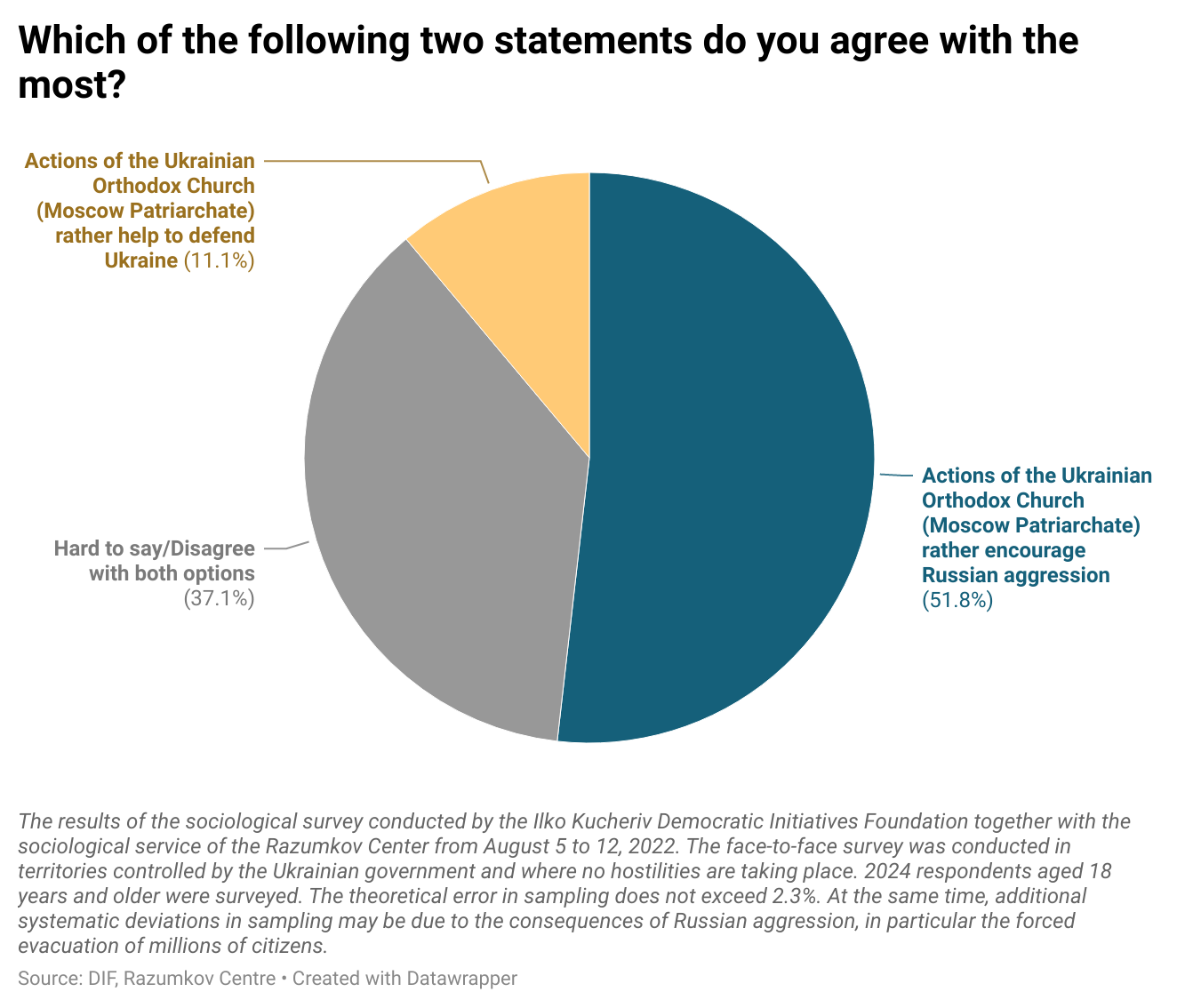
For most citizens, regardless of their age, region of residence, level of education or financial situation, the UOC (MP) is rather a threat to the sovereignty of Ukraine.
However, among the residents of the South and the East, a significant share is unsure whether it is really worth evaluating the church in terms of its role in the war. 60% of citizens living in the Southern regions and 57% of those living in the Eastern regions did not have clear vision if the UOC (MP) strengthened or harmed the defense of Ukraine. A similar position is shared by 49% of the respondents who speak Russian in everyday life.
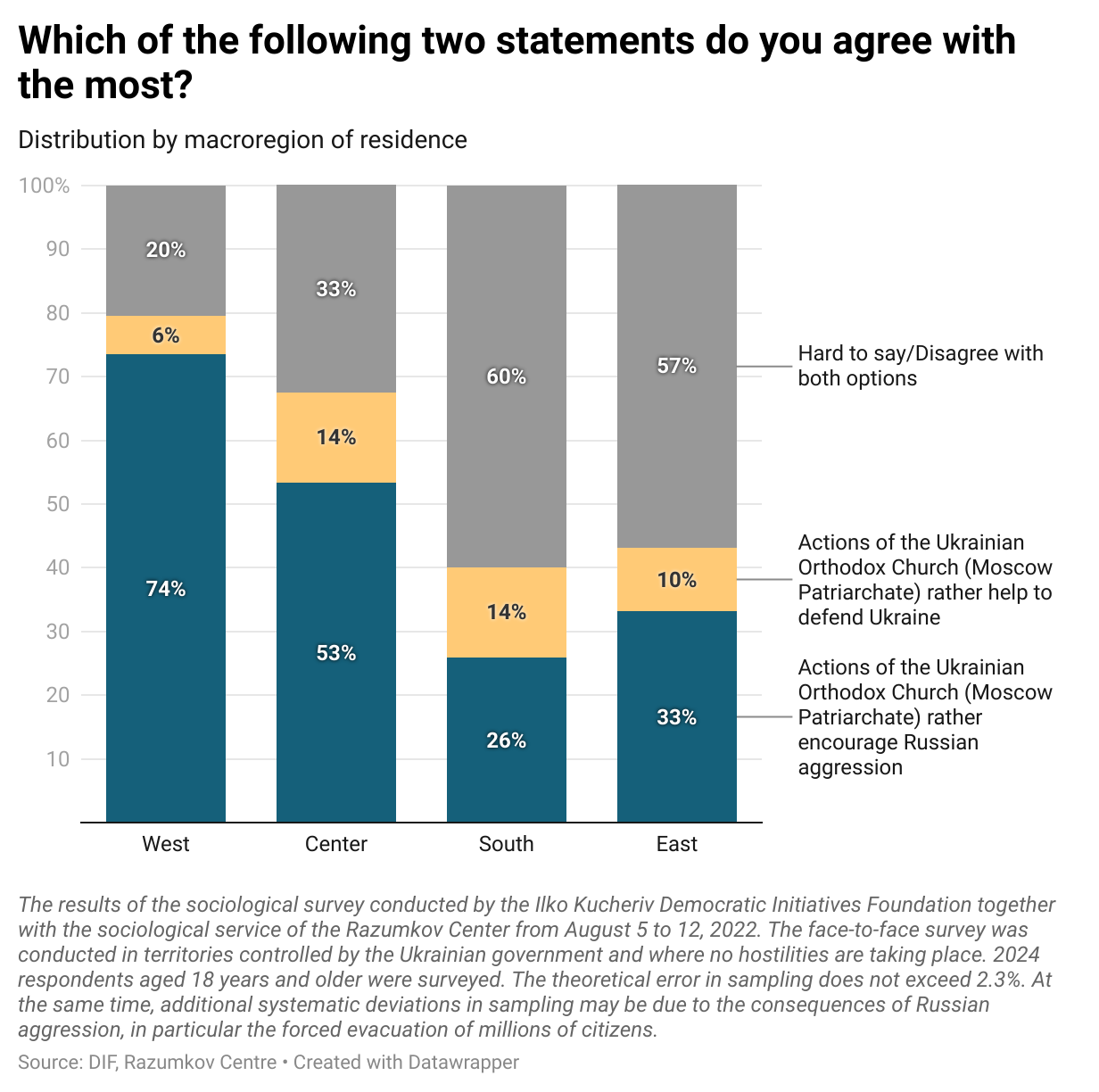
But this situation started to change even in the South. As of March 2023, 50% of Ukrainians in each region considered the activities of UOC-MP to be a factor that facilitated the Russian invasion, while up to 18%, depending on the region, disagreed. It is worth noting that during the survey, there was a conflict between the Ukrainian authorities and the UOC-MP, in particular over the termination of the UOC-MP's lease agreement for the Kyiv Pechersk Lavra.

Thus, already in December 2023 three-fourth of Ukrainians supported the decision of President Zelensky to impose sanctions on the higher clergy of the UOC (MP), it is supported even by one-third of the parishioners of the same UOC (MP) (!). Only 12% of respondents oppose.
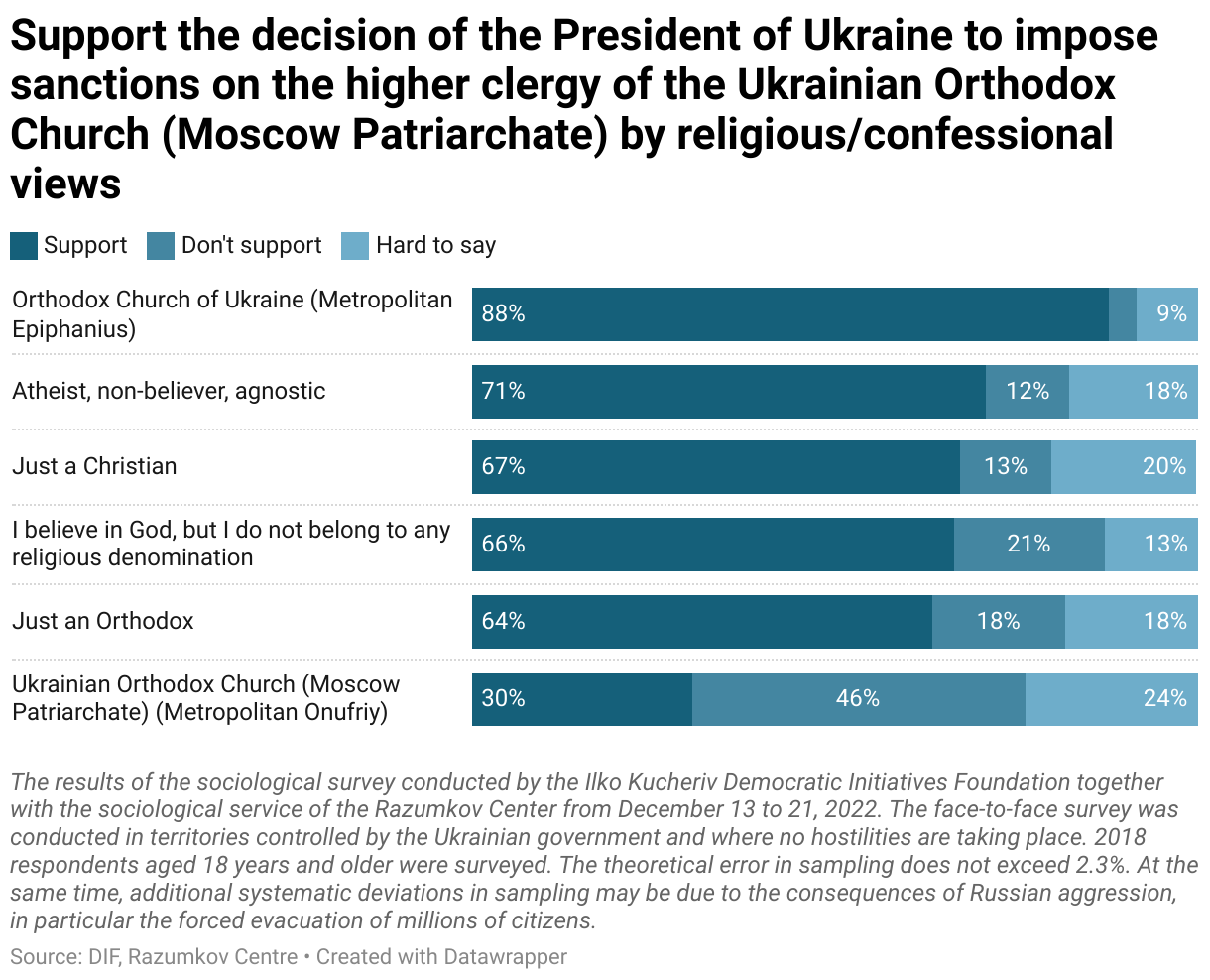
New Symbols of Ukrainian Fight for Freedom
Historical figures, prominent men and women, play an important role in national consolidation. With this in mind, we used a series of questions to find out whom citizens currently consider to be outstanding leaders who have helped to successfully resist Russian aggression.
Answering in March 2023 the open-ended question "Which politicians or public figures played an important role in the country's defense?", 65% of respondents mentioned President of Ukraine Volodymyr Zelensky, 47% - Commander-in-Chief of the Armed Forces of Ukraine Valeriy Zaluzhny. These are natural answers.
However, if we ask about the role of institutions, an important factor shaping the modern national memory is the recognition of the exceptional role of Ukrainian Defense Forces, volunteers, and the entire Ukrainian people in repelling Russian aggression.
In particular, 78% of Ukrainians share the opinion that the greatest role in repelling the Russian offensive was performed by the Ukrainian Defense Forces - the Armed Forces of Ukraine, the National Guard, the Territorial Defense Forces and other law-enforcement and paramilitary units. The second most common answer is that the main contribution in repelling Russian aggression was made by the entire Ukrainian people.
The third common opinion is the recognition of the role of volunteers and patriotic citizens in repelling Russian aggression - this opinion is shared by over 46% of respondents, with the highest result in Central Ukraine.
Although the President and Government of Ukraine have an extremely high level of legitimacy and recognition of their role in the defense of Ukraine, only 24% of respondents consider the role of the central government (President and Government) to be the main one in the first months of the war, with a relatively balanced distribution of this opinion across all regions of the country.
Curiously, in the East there is a significantly higher rate of recognition of the partisans' role in resisting Russians in the occupied territories - this opinion is shared by a quarter of the macro-region's residents. This factor is on the 4th place, moving Ukrainian authorities to the 5th place.

Public opinion is always influenced by the media, social networks and other sources that inform citizens about events in Ukraine and the world. Often, these same media not only inform, but also offer viewers an interpretation of events, inviting experts who analyze the facts covered in the news for readers/viewers.
After February 24, 2022, the demand for military expertise in Ukraine increased significantly as citizens sought to analyze and draw conclusions from the dozens and hundreds of fragmented facts they learned from the media. This led to an increase in the media visibility of military experts. To a large extent, they were also involved in shaping the collective memory of the war events, as they were the ones who promptly offered their audience interpretations of current events both on the battlefield and in the security and defense sector in general.
Therefore, the Democratic Initiatives Foundation included an experimental close-ended question about citizens' assessment of various actors who often act as experts or sources of exclusive information about events during the war. The data obtained will help to understand how the recognition and reputation of certain politicians and experts affects the spread of certain narratives about the war and how this can shape the perception of the war by different social groups.
Thus, according to the survey, the people who cover the events of the war most competently and in a balanced way include representatives of the Ukrainian government (Volodymyr Zelensky - 56%, Mykhailo Podoliak - 34%, Oleksiy Danilov - 21%, etc.) and independent experts, journalists and bloggers (Oleh Zhdanov - 23%, Yuriy Butusov - 17%, Vitaliy Portnikov - 13%, Serhiy Sternenko - 11%, etc.).

And here appeared the problem: the best and well balanced Ukrainian experts who have professional military training appeared at the end of the list while PR advisors to the presidential office divided 2nd and 3d places.
It showed that controlling media may influence the views of Ukrainians regarding this or that event. Hence the question: is there a threat to democracy in time of the war and martial law?
Democracy and the State During War
Despite the challenges of war and the traditional Ukrainian distrust to any authorities desicribed above, Ukrainians' trust both in the state and social institutions is only growing during the war. The largest positive “trust balance”[2] (70%-90%) in possessed by: the Army (in the first place with 90%); State Emergency Service (responsible, in particular, for countering blackouts, fires, effects of bombardments); the National Guard; “volunteers” (in Ukrainian lexicon - civil society, providing material support to the army), volunteer military formations, and the President of Ukraine (70%). Ukrainians traditionally least trust political parties, the judicial system, commercial banks, and the parliament. These institutions have the most negative trust balance.
Ukrainian society has had a paradoxical attitude toward democracy for a long time. On the one hand, there is a persistent demand for “a strong hand”, though it is decreasing from 75% in the late 2000s to 58% during the war. We remember how after every such poll Western journalists starting to bombard us with question: is there a new threat to democracy in Ukraine from within?
But, on the other hand, democracy is certainly considered a preferred type of system for Ukraine with the highest support in time of war (!): 64% against 14% of those “who think autocracy can be better than democracy under certain circumstances”. Given these results it seems that some Western societies may envy Ukraine which gives the new boost to democratic values and where far right and far left do not overcome the election threshold.
Indeed, there are restrictions in war-time Ukraine. The opposition supported the government and voted for martial law in February 2022. The role of oligarchs substantially decreased. There is an agreement in the society not to criticize excessively the government. However, the level of freedom of speech remains extremely high.
It is unjustified that authorities excluded three oppositional television channels from TV “social package” present in every home, but it is possible to reach them via widespread cable TV. Apart from this, the Internet media and Internet newspapers, very popular in Ukraine, offer the pluralism of views – they openly criticize authorities and discuss the effectiveness of governmental actions.
Facing the dilemma of how to criticize the government in times of war, the author of this piece follow a simple rule: never publicly criticize military operations, actions, Ukrainian command. Ukrainians know about mistakes of political leadership on the eve of the war, but the widespread belief is that we’ll talk about it after the victory. However, we do not feel restrained to criticize the cases of corruption, ineffective use of resources, that is about non-war-related misconduct. Ukrainians are not only fighting for the freedom and territorial integrity. Russia and Ukraine wage a war of values today.
Definitely, there are some figures in the government who would like to use the present situation and solidify their authority (first of all Andrij Yermak, presidential chief of staff). President Zelensky demonstrated messianic inclinations even before taking the highest post. Today, he became the world’s hero. And there is a danger that, when the victory is won, his belief in the messianic self may increase.
However, the war unleashed huge energy of the civil society. On every attempt of monopolization of power, Ukrainians respond with an outburst of resistance as they did in 2004 or 2014.
Regarding eternal dilemma of freedom and well-being, the August 2022 poll demonstrates that only 31% of respondents, in exchange for their own well-being, are willing to sacrifice a share of their rights and civil liberties to the state. However, more than 47% are willing to suffer some economic difficulties for the sake of personal freedom and guarantees of all civil rights. Another 22% were uncertain about their own answer. On the whole, the proportion of those hesitating with an answer in this survey has decreased significantly. Traditionally, the answers to this question were divided into three relatively equal shares, so we can now say that some people have decided on their preferences.
Therefore, despite inevitable concentration of power during the war-time martial law, there is a wide spread belief among Ukrainian experts that there would be no monopolization of power. The EU’s candidate status received by Ukraine in June 2022 strengthened this view. This status is viewed as a powerful tool of domestic transformation of Ukraine. Majority of Ukrainians consider that EU’s pressure for domestic reforms is justified which is also a positive signal.
[1] Victory Day and its role in the historical memory of Ukrainians: what meaning do citizens attach to this date? 4 May 2021, supported by MATRA, https://dif.org.ua/en/article/victory-day-and-its-role-in-the-historical-memory-of-ukrainians-what-meaning-do-citizens-attach-to-this-date
[2] Calculated as the difference between the share of those who trust and those who do not, https://dif.org.ua/en/article/trust-in-the-state-how-to-save-national-unity-for-the-victory
Illustration: Aleksandr Kolodko (instagram: @alexkolodko1)





